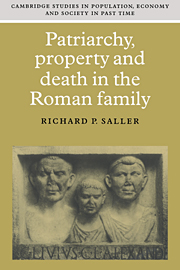Book contents
- Frontmatter
- Contents
- List of tables
- Preface
- Abbreviations
- 1 Introduction: approaches to the history of the Roman family
- Part I Roman life course and kinship: biology and culture
- Part II Roman family and culture: definitions and norms
- Part III The devolution of property in the Roman family
- Bibliography
- Index
- Cambridge Studies in Population, Economy and Society in Past Time
Part III - The devolution of property in the Roman family
Published online by Cambridge University Press: 23 November 2009
- Frontmatter
- Contents
- List of tables
- Preface
- Abbreviations
- 1 Introduction: approaches to the history of the Roman family
- Part I Roman life course and kinship: biology and culture
- Part II Roman family and culture: definitions and norms
- Part III The devolution of property in the Roman family
- Bibliography
- Index
- Cambridge Studies in Population, Economy and Society in Past Time
Summary
To translate paterfamilias as “head of the household” is to capture only a part of its semantic range. For modern students of Roman society the term evokes that most powerful image of the Roman family, the authoritarian father exercising autocratic control over the members and property of his house. The classical Romans, however, more often used the term to mean simply “property owner.” The opposition between the bonus and malus paterfamilias involved a judgment about estate management: whereas the malus paterfamilias handled his property carelessly, the bonus paterfamilias diligently managed his patrimony and came to represent a legal standard of sound administration in juristic thought. Although classical prose authors frequently use paterfamilias without any thought of a family, for fathers the responsibilities for family and property were closely linked. In a society in which property was essential to the well being and status of the family, good husbandry was among the most important duties to the generations to come. Seneca expressed the ideal succinctly (Ep. 64.7): “Let us act as the bonus paterfamilias. Let us increase what we received. Let that inheritance pass enlarged from me to my descendants.”
Seneca's words make the matter of transmission of property to the next generation sound simple, but it was not. For those Romans who made use of the written wills and dotal pacts available in law, nothing was automatic. Decisions had to be made in the face of unpredictable mortality and in the context of a legal system that permitted divorce and gave the right to own property to wives but not to adult children in potestate.
- Type
- Chapter
- Information
- Patriarchy, Property and Death in the Roman Family , pp. 155 - 160Publisher: Cambridge University PressPrint publication year: 1994
- 1
- Cited by

